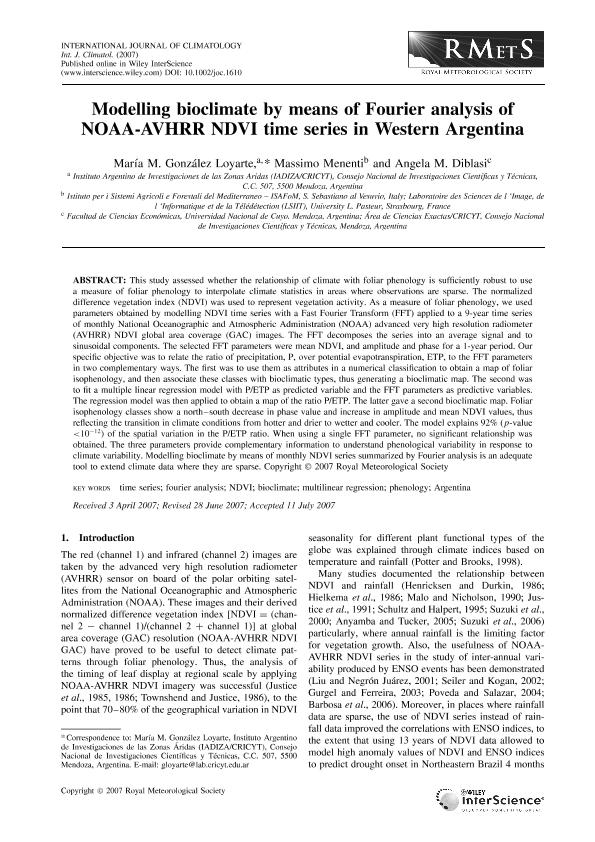Mostrar el registro sencillo del ítem
dc.contributor.author
Gonzalez Loyarte, Maria Margarita

dc.contributor.author
Menenti, Massimo
dc.contributor.author
Diblasi, Angela Magdalena

dc.date.available
2019-12-26T14:12:45Z
dc.date.issued
2008-12
dc.identifier.citation
Gonzalez Loyarte, Maria Margarita; Menenti, Massimo; Diblasi, Angela Magdalena; Modelling bioclimate by means of Fourier analysis of NOAA-AVHRR NDVI time series in Western Argentina; John Wiley & Sons Ltd; International Journal of Climatology; 28; 9; 12-2008; 1175-1188
dc.identifier.issn
0899-8418
dc.identifier.uri
http://hdl.handle.net/11336/92890
dc.description.abstract
This study assessed whether the relationship of climate with foliar phenology is sufficiently robust to use a measure of foliar phenology to interpolate climate statistics in areas where observations are sparse. The normalized difference vegetation index (NDVI) was used to represent vegetation activity. As a measure of foliar phenology, we used parameters obtained by modelling NDVI time series with a Fast Fourier Transform (FFT) applied to a 9-year time series of monthly National Oceanographic and Atmospheric Administration (NOAA) advanced very high resolution radiometer (AVHRR) NDVI global area coverage (GAC) images. The FFT decomposes the series into an average signal and to sinusoidal components. The selected FFT parameters were mean NDVI, and amplitude and phase for a 1-year period. Our specific objective was to relate the ratio of precipitation, P, over potential evapotranspiration, ETP, to the FFT parameters in two complementary ways. The first was to use them as attributes in a numerical classification to obtain a map of foliar isophenology, and then associate these classes with bioclimatic types, thus generating a bioclimatic map. The second was to fit a multiple linear regression model with P/ETP as predicted variable and the FFT parameters as predictive variables. The regression model was then applied to obtain a map of the ratio P/ETP. The latter gave a second bioclimatic map. Foliar isophenology classes show a north-south decrease in phase value and increase in amplitude and mean NDVI values, thus reflecting the transition in climate conditions from hotter and drier to wetter and cooler. The model explains 92% (p-value <10-12) of the spatial variation in the P/ETP ratio. When using a single FFT parameter, no significant relationship was obtained. The three parameters provide complementary information to understand phenological variability in response to climate variability. Modelling bioclimate by means of monthly NDVI series summarized by Fourier analysis is an adequate tool to extend climate data where they are sparse.
dc.format
application/pdf
dc.language.iso
eng
dc.publisher
John Wiley & Sons Ltd

dc.rights
info:eu-repo/semantics/openAccess
dc.rights.uri
https://creativecommons.org/licenses/by-nc-sa/2.5/ar/
dc.subject
ARGENTINA
dc.subject
BIOCLIMATE
dc.subject
FOURIER ANALYSIS
dc.subject
MULTILINEAR REGRESSION
dc.subject
NDVI
dc.subject
PHENOLOGY
dc.subject
TIME SERIES
dc.subject.classification
Ecología

dc.subject.classification
Ciencias Biológicas

dc.subject.classification
CIENCIAS NATURALES Y EXACTAS

dc.title
Modelling bioclimate by means of Fourier analysis of NOAA-AVHRR NDVI time series in Western Argentina
dc.type
info:eu-repo/semantics/article
dc.type
info:ar-repo/semantics/artículo
dc.type
info:eu-repo/semantics/publishedVersion
dc.date.updated
2019-10-10T19:34:46Z
dc.journal.volume
28
dc.journal.number
9
dc.journal.pagination
1175-1188
dc.journal.pais
Reino Unido

dc.journal.ciudad
Londres
dc.description.fil
Fil: Gonzalez Loyarte, Maria Margarita. Consejo Nacional de Investigaciones Científicas y Técnicas. Centro Científico Tecnológico Conicet - Mendoza. Instituto Argentino de Investigaciones de las Zonas Áridas. Provincia de Mendoza. Instituto Argentino de Investigaciones de las Zonas Áridas. Universidad Nacional de Cuyo. Instituto Argentino de Investigaciones de las Zonas Áridas; Argentina
dc.description.fil
Fil: Menenti, Massimo. Université de Strasbourg; Francia. Istituto per i Sistemi Agricoli e Forestali del Mediterraneo; Italia
dc.description.fil
Fil: Diblasi, Angela Magdalena. Universidad Nacional de Cuyo. Facultad de Ciencias Económicas; Argentina. Consejo Nacional de Investigaciones Científicas y Técnicas. Centro Científico Tecnológico Conicet - Mendoza; Argentina
dc.journal.title
International Journal of Climatology

dc.relation.alternativeid
info:eu-repo/semantics/altIdentifier/doi/http://dx.doi.org/10.1002/joc.1610
dc.relation.alternativeid
info:eu-repo/semantics/altIdentifier/url/https://rmets.onlinelibrary.wiley.com/doi/abs/10.1002/joc.1610
Archivos asociados
